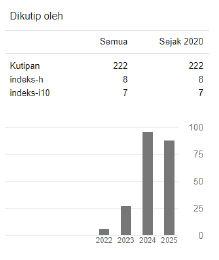The Qur’anic Methods in Instilling Characters in a family: An Educational Perspective
 https://doi.org/10.54012/ijcer.v3i2.309
https://doi.org/10.54012/ijcer.v3i2.309
 Abstract views: 366
Abstract views: 366
 PDF downloads: 289
PDF downloads: 289
Keywords:
characters, education, family, Insan Kamil, Qur’anic methodsAbstract
Characters are closely related to morality which is underpinned on the moral strength based on the value system instilled as early as possible in a family. The study aims to discuss the Qur’anic methods used to instill the early childhood’s characters in a family. To gain the data, the researchers employ qualitative method under descriptive approach. In addition, to analyse the data, it is used content analysis technique. The results of the study assert that characters education needs to be taught and instilled as early as possible to early childhood at home. Through the education, the parents need an enormous efforts to instill characters education to the early childhood. One of the efforts is using the Qur’anic methods used to instill the early childhood’s characters in a family. The Qur’anic methods consist of the Amtsal method, the Kisah (story) method, the Ibrah Mauidzah method, the Targhib wa Tarhib method, the Tajribi method, the Uswah Hasanah method, and the Hiwar method. In conclusion, instilling characters to early childhood in a family needs the suitable methods, so that its implementation is going to be in harmony with planning and achieve the goal to create early childhood to be ‘Insan Kamil’.
Downloads
References
Y. Hidayat, Panduan Pernikahan Islami. Depok: Penerbit Guepedia, 2019.
Y. Hidayat, Panduan Pernikahan, Kehamilan, Persalinan Dan Menyusui Berdasarkan Al-Quran, Al-HAdits, Medis, Dan Empiris for Millenials. Tuban: Penerbit Mitra Karya, 2019.
S. Rahmah, “Akhlak dalam Keluarga,” Alhadharah J. Ilmu Dakwah, vol. 20, no. 2, pp. 27–42, 2021, doi: 10.18592/alhadharah.v20i2.5609.
A. Machrus, N. Rofiah, and F. A. Qadir, Buku Fondasi Keluarga Sakinah, Bacaan Mandiri Calon Pengantin.pdf. Jakarta: Direktur Bina KUA dan Keluarga Sakinah, Kementerian Agama Republik Indonesia, 2023.
N. Mulyono, A. Herniawati, and Y. Hidayat, “Bedtime Storytelling: A Method to Enhance Early Childhoods’ Language Development,” J. Pendidik. Anak Usia Dini Undiksha, vol. 11, no. 3, pp. 61–69, 2023, doi: 10.23887/paud.v11i3.68552.
Y. Hidayat, N. Tania, N. Nurhayati, N. Kurniasih, H. Nuraeni, and S. Ningsih, “An analysis of parenting styles on early childhood’s independent character development,” Int. J. Corner Educ. Res., vol. 2, no. 2, pp. 70–76, 2023, doi: 10.54012/ijcer.v2i2.207.
R. Handayani, I. Purbasari, D. Setiawan, F. Ahmadi, and R. P. Praswanti, “The Role of Family Education in Forming the Independent Character of Students in Elementary School,” Int. J. Elem. Educ., vol. 5, no. 2, pp. 291–297, 2021, doi: 10.23887/ijee.v5i2.30812.
S. Krisnawati and R. Rohita, “The Role of Father in Instilling Moral Values in Children Aged 4 – 5 Years in Kampung Bonjol Selatan, South Tangerang,” Proc. Int. Conf. Educ. Sci. Teach. Prof. (ICETeP 2020), vol. 532, no. 532, pp. 447–450, 2021, doi: 10.2991/assehr.k.210227.076.
N. Nafiah, U. Jamaludin, D. S. Fitrayadi, and F. Saefulloh, “The Role of the Smart House Program in Instilling Character (Case Study at the Al-Ikhlas Smart House in Serang City),” Int. J. Soc. Sci. Res. Rev., vol. 6, no. 10, pp. 1–14, 2023, doi: 10.47814/ijssrr.v6i10.1580.
M. Habib and D. Nadira, “The Role of the Family in Character Education for Children,” Ontol. J. Pembelajaran dan Ilmu Pendidik., vol. 2, no. 1, pp. 27–36, 2024.
J. R. Fraenkel, N. E. Wallen, and H. H. Hyun, How to design and evaluate research in education, eight edition. New York: New York: The McGraw-Hill Companies, Inc., 2012.
Y. Hidayat, A. Herniawati, and N. Ihsanda, “The use of drilling technique to teach English speaking to the early childhoods: A descriptive study,” J. Corner Educ. Linguist. Lit., vol. 2, no. 1, pp. 73–80, 2022, doi: 10.54012/jcell.v2i1.66.
A. Hambali, A. Herniawati, and Y. Hidayat, “Scope of the Philosophy of Science: A Review of Philosophical Education,” J. Corner Educ. Linguist. Lit., vol. 3, no. 3, pp. 231–240, 2024, doi: 10.54012/jcell.v3i3.263.
F. Baier, A.-T. Decker, T. Voss, T. Kleickmann, U. Klusmann, and M. Kunter, “What makes a good teacher? The relative importance of mathematics teachers’ cognitive ability, personality, knowledge, beliefs, and motivation for instructional quality,” Br. J. Educ. Psychol., vol. 89, no. 4, pp. 767–786, 2019, doi: 10.1111/bjep.12256.
A. M. Flanagan, D. C. Cormier, and O. Bulut, “Achievement may be rooted in teacher expectations: examining the differential influences of ethnicity, years of teaching, and classroom behaviour,” Soc. Psychol. Educ., vol. 23, pp. 1429–1448, 2020, doi: 10.1007/s11218-020-09590-y.
S. F. Shodiq, “Pendidikan Karakter Melalui Pendekatan Penanaman Nilai dan Pendekatan Perkembangan Moral Kognitif,” At-Tajdid J. Pendidik. dan Pemikir. Islam, vol. 1, no. 1, pp. 14–25, 2017, doi: 10.24127/att.v1i01.332.
A. Rifa’i, “Pendidikan Akhlak Dalam Keluarga (Tinjauan Normatif dalam Islam),” Al-Madrasah J. Pendidik. Madrasah Ibtidaiyah, vol. 3, no. 2, pp. 235–257, 2019, doi: 10.35931/am.v0i0.138.
A. Kartini and A. Maulana, “Model Pendidikan Karakter Dalam Keluarga,” An-Nisa’ J. Kaji. Peremp. Keislam., vol. 13, no. 2, pp. 231–253, 2020, doi: 10.36928/jpkm.v11i1.142.
Y. Ruyadi, “Model Pendidikan Karakter Berbasis Kearifan Budaya Lokal (Penelitian terhadap Masyarakat Adat Kampung Benda Kerep Cirebon Provinsi Jawa Barat untuk Pengembangan Pendidikan Karakter di Sekolah),” Proc. 4th Int. Conf. Teach. Educ. Join Conf. UPI UPSI, vol. 8, no. 10, pp. 576–594, 2010.
Y. Yunani, “Model Pendidikan Karakter Dalam Keluarga (Studi Kasus Pada Keluarga Yang Istrinya Berprofesi Sebagai Guru PAI SD Di Lingkungan UPTD Pendidikan Kecamatan Jalaksana Kabupaten Kuningan),” OASIS J. Ilm. Kaji. Islam, vol. 2, no. 1, pp. 1–19, 2017.
S. Supriyono, H. Iskandar, and G. Gutama, Pendidikan Keluarga Dalam Pembentukan Karakter Bangsa. Jakarta: Direktorat Jenderal Pendidikan Anak Usia Dini dan Pendidikan Masyarakat, Kementerian Pendidikan dan Kebudayaan, 2015.
S. Syahidin, Aplikasi Metode Pendidikan Qurani Dalam Pembelajaran Agama Di Sekolah. Tasikmalaya: Pondok Pesantren Suryalaya Tasikmalaya, 2005.
W. Wahyuddin, “Family Education According to the Qur’anic Perspective: A Review of the Tarbawi Interpretation,” Qathruna J. Keilmuan dan Pendidik., vol. 2, no. 2, pp. 179–200, 2015.
Downloads
Published
How to Cite
Issue
Section
License
Copyright (c) 2024 Ani Herniawati, Yusuf Hidayat, Aan Hasanah, Bambang Samsul Arifin

This work is licensed under a Creative Commons Attribution-ShareAlike 4.0 International License.









